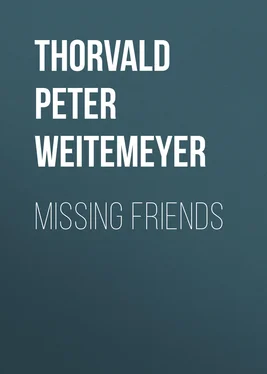Thorvald Peter Ludwig Weitemeyer - Missing Friends
Здесь есть возможность читать онлайн «Thorvald Peter Ludwig Weitemeyer - Missing Friends» — ознакомительный отрывок электронной книги совершенно бесплатно, а после прочтения отрывка купить полную версию. В некоторых случаях можно слушать аудио, скачать через торрент в формате fb2 и присутствует краткое содержание. Жанр: Путешествия и география, foreign_antique, foreign_prose, на английском языке. Описание произведения, (предисловие) а так же отзывы посетителей доступны на портале библиотеки ЛибКат.
- Название:Missing Friends
- Автор:
- Жанр:
- Год:неизвестен
- ISBN:нет данных
- Рейтинг книги:3 / 5. Голосов: 1
-
Избранное:Добавить в избранное
- Отзывы:
-
Ваша оценка:
- 60
- 1
- 2
- 3
- 4
- 5
Missing Friends: краткое содержание, описание и аннотация
Предлагаем к чтению аннотацию, описание, краткое содержание или предисловие (зависит от того, что написал сам автор книги «Missing Friends»). Если вы не нашли необходимую информацию о книге — напишите в комментариях, мы постараемся отыскать её.
Missing Friends — читать онлайн ознакомительный отрывок
Ниже представлен текст книги, разбитый по страницам. Система сохранения места последней прочитанной страницы, позволяет с удобством читать онлайн бесплатно книгу «Missing Friends», без необходимости каждый раз заново искать на чём Вы остановились. Поставьте закладку, и сможете в любой момент перейти на страницу, на которой закончили чтение.
Интервал:
Закладка:
But all this is digression. Still, it is a matter which excites considerable interest in Queensland, and as I think of that time, these thoughts come uppermost in my mind. No doubt if I, in the office, had met a man who came from the colony, and who could have advised me and spoken with confidence about the country itself, I should have made up my mind to go in a far less reckless way, and probably I should never have acquired, after my arrival in the country, that roving disposition which I contracted, and which did not leave me for many years, if it has even left me now. Well, I made up my mind to go. I also made up my mind that it was unnecessary for me to work any more in Hamburg while waiting for the ship, so I took a holiday and went about town every day, spending my money to the last farthing. I had bought a revolver, ammunition, and a long knife. I had bought my ticket too, and so the day arrived when we were all mustered and put on board the ship.
CHAPTER II.
ON THE EMIGRANT SHIP—THE JOURNEY TO QUEENSLAND
What a motley crew we were: Germans, Danes, Swedes, Norwegians, a Russian Finn, and an Icelander. There were many nationalities, but in the majority of cases extreme poverty was evident in their dress and stamped upon their faces, and it was easy to see that the same spirit of recklessness which filled me had somehow also been instilled into them. Nearly everybody had guns, revolvers, and knives, which were promptly taken from us as we stepped on board. Then the Germans would sing in their language of the Fatherland they had left, and in overflowing gush, men, women, and children would hang about one another's necks. Everybody acted in such a mad manner as, I am quite sure, he would never have thought of behaving in any time before. Most of the men were drunk, and as it grew dark at night one would seek for the other, and as no one knew the way about, a perfect pandemonium was raging—singing, fighting, blubbering in all languages. I do believe if I had had a sixpence left, I should have spent it in schnapps too, because my courage had never been tried so hard before. But I had spent my all, and so I made a virtue of necessity, and stood aloof looking round me in silent wonder as to what the end would be.
The prospectus said that the best and most wholesome food would be served out to us in abundance, and to look at the bill of fare one would think it enough to satisfy any gormandizer. But we got nothing at all the first day, and I was unspeakably hungry. The prospectus said also that bed-clothes were supplied to us, and these were already in the bunks—it said mattrass, pillow, sheets, and blanket. The mattrass and pillow were right enough. The sheets it did not matter much about—they were no good at all for their purpose. But the blanket, the only thing we had to cover ourselves with at night on a four months' voyage, was smaller than the size of a little dining-table when it was spread out, about the size of a saddle-cloth and much inferior in quality to anything worthy of the name of blanket I have ever seen before or since. As a consequence, those who had like myself put faith in that part of the promises made us, and who had no other bed-clothes, were compelled when we went to bed at night, to put on all the clothes we had and sleep in them. I slept every night for months at a stretch in my overcoat, woollen comforter around my neck, and the blanket, the all sufficient bed-clothes, rolled round my head!
I did not, as it may be imagined, sleep at all the first night on board the ship. At break of day the cook came in with a large wooden bowl of hot potatoes, which he put on the table singing out, "Breakfast!" I was thankful because I was very hungry, and I began at once to get out of the bunk so as to lose no time, but I was not half way to the table before a dozen Germans had rushed the dish and stuffed all the hot potatoes into their pockets, their shirts, anywhere. There was not a taste left! We were twenty-six men in that compartment, and now the row of last night began again with renewed vigour. I looked upon it as a lesson in smartness which I should have to learn, and I thought that if I did not learn it soon it would be a bad job. Half of the twenty-six men were Danes—in fact we were fourteen Danes in the compartment against twelve Germans, because I, who hailed from Hamburg, had been classified as a German although I am not. I believe it was a premeditated assault on the potatoes by the Germans, because they were all in it, and not one of the Danes had got a morsel to eat. The twelve Germans gave nothing up. They ate the potatoes intended for us all with great composure while we others were storming at them. Didn't I feel wild!
While the dissatisfaction was at its highest point, somebody we had not yet seen came into the cabin. He was a person with a decided military air about him, and he was also dressed in a gorgeous uniform. Two of the passengers who had already been sworn in to act as police constables during the voyage came behind him, and in one of his uplifted hands he held a document which he was waving at us. "Halt," cried he. "Halt, Donnerwetter, I say, halt, while I read this paper." All the Germans without an exception had just come from the Franco-German war, and the sight of the uniform and the determined military air about the doctor, as we soon discovered him to be, had the effect of shutting them up in an instant. Some of the Danes were also old soldiers; anyhow, you might have heard a pin drop while the doctor, who also came straight from the war, where he had been army surgeon, read a proclamation, the exact words of which I forget, but which was to the purpose that he had supreme command over us all, and—"Donnerwetter," cried he, "Donnerwetter, I will have order. If you are not amenable to discipline I will handcuff every one of you. What sort of Knechte are you?" This last remark was addressed to a big strapping-looking German who happened to stand close to him. The German stood as stiff as a statute, saluting with the one hand, while with the other he made a slight movement which threw his overcoat a little to one side and displayed a silver cross which he wore on his vest. "Ha!" cried the doctor, greatly mollified, "I see you have served the Kaiser to some purpose. Don't forget you are not outside the Kaiser's law yet. I hope we shall be friends." Then he marched off to read his proclamation in other parts of the ship. These Germans, I found out by degrees, were not at all bad fellows, but we did not for a long time forgive them the assault on the potatoes, and I have often thought what a peculiar sign of German thrift it was. They had simply taken in the situation more quickly than we; indeed it has become nearly a proverb in Queensland to say that a German will grow fat where other men will starve. After that time order was restored, and no disturbance worth mention occurred on the whole voyage.
Nothing can well be more tedious than a sea voyage of four months under our circumstances. The food was wretched and insufficient, and, as I have already mentioned, most of us had to sleep with all our clothes on us. We did not undress; we rather dressed to go to bed!
There was not a single individual among the passengers who understood English. It is true I had learned English for seven years in school, but when we came ashore it proved that I could scarcely make myself understood in a single sentence. None of us knew anything about Queensland, and many were the surmises and guesses at what the country was like and what we were going to do there. I remember distinctly once a number of us were sitting talking about the colony, and that one ventured to say that he had heard how in Queensland, when journeymen tradesmen were travelling about looking for work, they needed no "wander-book," and travelled about on horseback; whereupon another got up much offended, and said that he had heard many lies about Queensland, but this last beat all. He did not know so much about the "wander-book," although he had taken good care to have his own in order, but if any one tried to make him believe that beggars went about on horseback over there, then it was time to cry stop. "No," said he, "he knew we should have to walk." We others concurred.
Читать дальшеИнтервал:
Закладка:
Похожие книги на «Missing Friends»
Представляем Вашему вниманию похожие книги на «Missing Friends» списком для выбора. Мы отобрали схожую по названию и смыслу литературу в надежде предоставить читателям больше вариантов отыскать новые, интересные, ещё непрочитанные произведения.
Обсуждение, отзывы о книге «Missing Friends» и просто собственные мнения читателей. Оставьте ваши комментарии, напишите, что Вы думаете о произведении, его смысле или главных героях. Укажите что конкретно понравилось, а что нет, и почему Вы так считаете.












